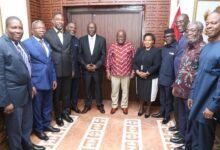‘Embrace pan-Africanism to be globally significant’

As the power of globalisation continues to weaken boundaries of statehood, it is high time for Africans to become aware of their political and economic environment by embracing Pan-Africanism, as the wheel of change for global significance, Dr Michael Williams has said.
Dr Williams, a former Academic Director of Webster University, Ghana, said Africa with her immense natural resources could then gain comparative advantage economically over other national blocs.
He advocated for African unity to tackle common issues affecting the continent in a lecture yesterday at the 2019 Annual Du Bois-Padmore-Nkrumah and the Year of Return lectures organised by the W.E.B Du Bios Memorial Centre for Pan African Culture, Ghana Tourism Authority and the Kwame Nkrumah Memorial Park.
The lecture which was designed to bring into focus aspects of the multi-faceted contemporary Pan-African vision and its realisation was under the theme: ‘Pan-Africanism reflections on resistance, dignity in the face of atrocity.’
The event also served as a forum for the re-examination of the ideals of Pan-African and its relevance to the social, political, cultural and economic sphere of the 21st century of the African through panel discussion.
Dr Williams said of the numerous concepts which influenced black Africa since independence, Pan-Africanism after democracy was one of the ideals which was still relevant to serve the course of emancipation of Africa, adding however, that the continent after all these years of presenting Pan-Africanism remained the least integrated in the world which continued to experience outbreak of xenophobic violence, with South Africa being the latest culprit.
He said pioneers of the Pan-Africanism such as Du Bios, Padmore, Marcus Garvey and Nkrumah in those early days had a common goal to unite black people across the world in order to fight slavery and colonialism, but the quest for Pan-Africanism to remain relevant in today’s Africa meant that there was the need to shift focus to good governance and economic empowerment.
Dr Williams said the renewal of the Pan-Africanism attitude must shift to increase African trade, political partnership and good governance, adding that the continent was so endowed with rich natural resources enough to become economic super power.
Citing some of the natural resources, he said Africa had abundant arable land and water sources for irrigation to feed the entire continent and export market, however those resources were very much being underutilised, creating a big productive gap.
Dr Williams asked African leaders to perceive unity of purpose as being a crucial element in the resuscitation of the economic and social plight of the continent, adding that the Pan-Africanism ideology asserted that the fate of all African people and countries were intertwined.
Dr Ziblim Barri Iddi, Deputy Minister of Tourism, Arts and Culture, earlier in a welcome address commended the centre for organising the lecture under the flagship programme of the Year of Return, to bring people of African descent from the Diaspora to Ghana.
In a historical context, Pan-Africanism served as both a cultural and political ideology from the solidarity of people of African descent. It aimed to encourage and strengthen bonds of solidarity between all indigenous and Diasporan ethnic groups of African descent.
BY LAWRENCE MANKWEI AND KIMBERLY FREMPONG






